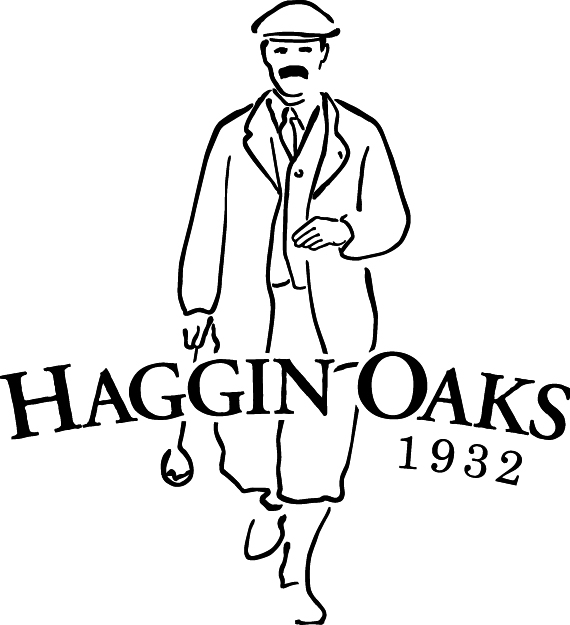The word is getting out about “Golf Fore Health,” a program that is based at the Haggin Oaks Golf Complex in Sacramento and designed for those who have physical, mental or emotional challenges.
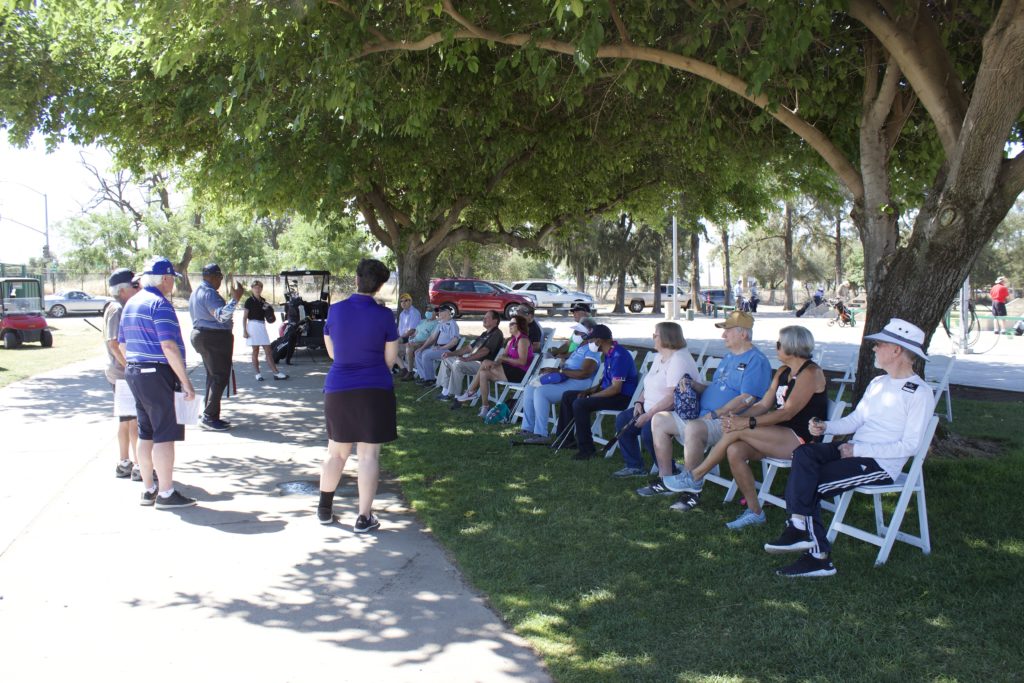
Ken Hurdle, the lead coach for “Golf Fore Health,” is doing all he can to promote the program, which is run in conjunction with the Northern California Institute of Golf.
For the first time, “Golf Fore Health” has a newsletter, announcing the May 5 start date for the first session.
The newsletter, put together by Hurdle, also provides information for golfers and volunteers as to how they can go about getting ready for the season with details about how to clean your clubs, grips and golf bag, as well as some practice tips in advance of the 2021 season.
Hurdle and others with “Golf Fore Health” have also contacted area hospitals, personal trainers, physical therapy offices, and businesses as a way to provide exposure for the program.
“This kind of communication has never been done before. It’s like, let’s pump it up and see what we can get,” said Hurdle, who is also an instructor at Haggin Oaks, a 36-hole facility that features the Alister MacKenzie Golf Course, Arcade Creek Course, driving range and learning center that features 100 hitting stalls and raised target greens, Haggin Oaks Academy Holes, MacKenzie Putting Course, Player Performance Studio, Club Performance and Repair Center, and Super Shop.
Hurdle is anticipating a “good turnout” for the program, which has an emphasis on coaching players in all areas of the game.
It looks like we’re going to have some people that haven’t been around before. We don’t act as therapists. We’re coaches, to help them with golfing. But they can bring therapists with them.
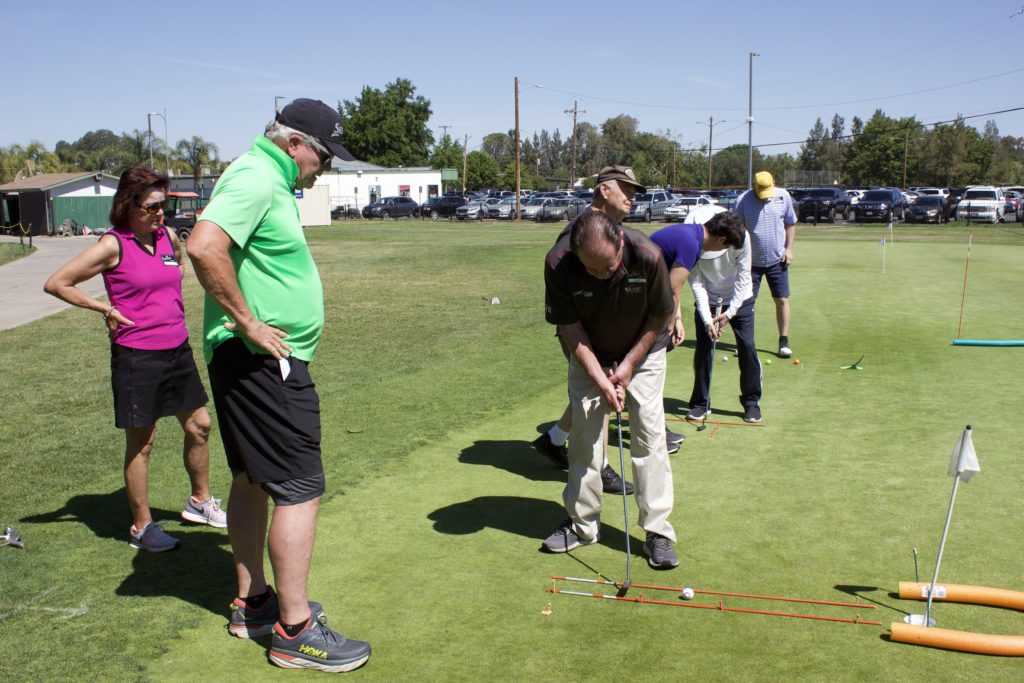
“We increased our outreach for this year,” said Hurdle. “Before, everything was word of mouth. But this year, we contacted all of the rehabilitation folks in the Sacramento area, to try and expand our region.
“It’s just giving more opportunities for folks to play golf. If you can’t afford to do it … we don’t turn anybody away.
It’s not about making money. It’s about making family. And what has happened with this group of folks is that they’ve become such a community in and of themselves. They just enjoy seeing each other.
“I’m anticipating some growth. We really don’t have an idea of what the impact is going to be of having advertised through the rehabilitation centers and hospitals, because it’s never been done before. We’re thinking big. We’re hoping big. I’m going to be calling all the folks that are on the regular roster.”
In the latest newsletter, Hurdle points out that 2020 was a “tough year for the program with all that was going on.” The outreach effort is geared toward expanding the number of participants in the program.
“Golf Fore Health,” which was previously known as “Saving Strokes,” is one of the adaptive golf programs that are hosted by the Northern California Institute of Golf at Haggin Oaks, according to www.hagginoaks.com.
Sessions offered by ‘Golf Fore Health’
“Golf Fore Health” has two sessions.
The cost is $349.99 for the 18-week program.
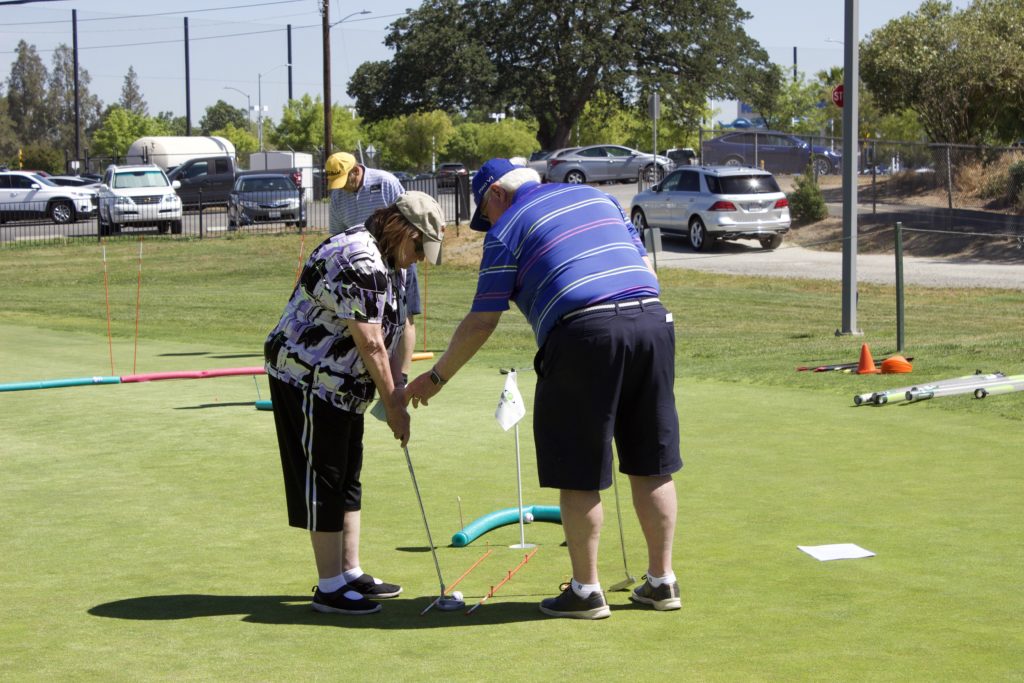
New this year, according to the newsletter, are Monday “Coaching Sessions,” during Weeks 2 through 8 of each session, at no additional cost.
These one-hour sessions will be designed around the areas that you would like to work on, to improve your game, as well as the basics.
New this year is the “Hot Dog Scramble,” where each participant will have the opportunity to team up with a family member, caregiver or volunteer during a nine-hole scramble event. It is scheduled for the last week of each session.
Session One, Wednesdays at 10:45 a.m., start on May 5 (putting green) and continue May 12, May 19, May 26, June 2, June 9, June 16, June 23, and June 30 with the “Hot Dog Scramble.”
Session Two, Wednesdays at 10:45 a.m., start on Sept. 1 (putting green) and continue Sept. 8, Sept. 15, Sept. 22, Sept. 29, Oct. 6, Oct. 13, Oct 20 and Oct. 27 with the “Hot Dog Scramble.”
In addition, coaching sessions are also offered. These are available as a “stand-alone,” for $100, for those not wanting to participate in the nine-week sessions.
It’s for all levels of golfers and is designed around the areas that individual golfers want to improve in, as well as the basics. The sessions are on Mondays, from 10 to 11 a.m.
Session One, at 10 a.m., is May 10, May 17, May 24, June 7, June 14, June 21 and June 28.
Session Two, at 10 a.m., is Sept. 13, Sept. 20, Sept. 27, Oct. 4, Oct. 11, Oct. 18 and Oct. 25.
The theme for “Golf Fore Health” is “Relaxation & Rehabilitation Through Golf.”
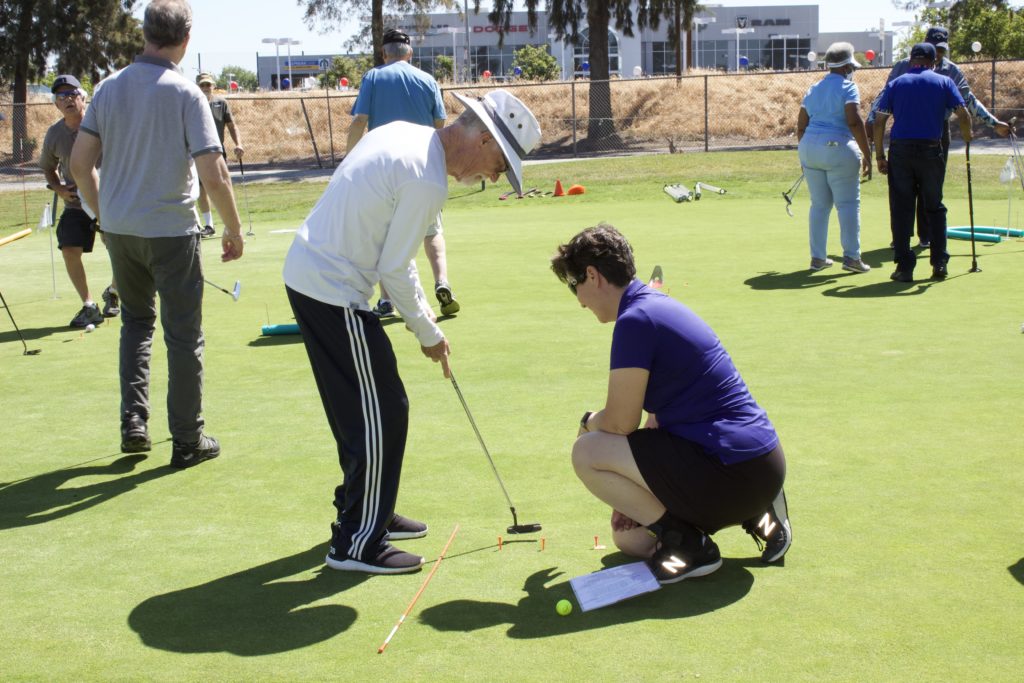
Hurdle and Larry Aronsen are the coaches for “Golf Fore Health.” Participants work on their game at the driving range and putting green.
Each class spends most of its time on the golf course, from 10:45 a.m. to 12:15 p.m., during the nine-week session. Participants spend time off the course as well.
The program receives assistance from several volunteers.
According to the program, “Participants come to ‘Golf Fore Health’ with varying experiences, so whether you are a brand-new golfer or one who has been playing for years, there is space for you!”
Four adaptive vehicles are available for use, according to the program.
Participants include those who have post-traumatic stress disorder or multiple sclerosis, or have had a stroke or heart attack.
“It’s any kind of disability. You’re welcome to come and play,” said Hurdle. “I get excited just watching when they hit a ball. I’ve watched some of these people progress over the last three or four years.”
Hurdle said he is very proud to serve as lead coach of the program.
“The things we’re doing this year are brand new things that have never been done before,” said Hurdle. “Let’s make it really special for them.
“I like the transformation that I see in folks, when they self-discover and learn this or learn that, and they tell me, ‘Hey, look at this thing that I can do now.’ And that for me, just gives me chills, doing those kinds of things. I know these folks are doing the best they can. It’s an opportunity for them to learn.”
Each participant in the program that plays in the “Hot Dog Scramble” will have their photo taken, with a framed certificate that is presented to them. They will also receive a hot dog, chips and a soft drink.
Background in golf
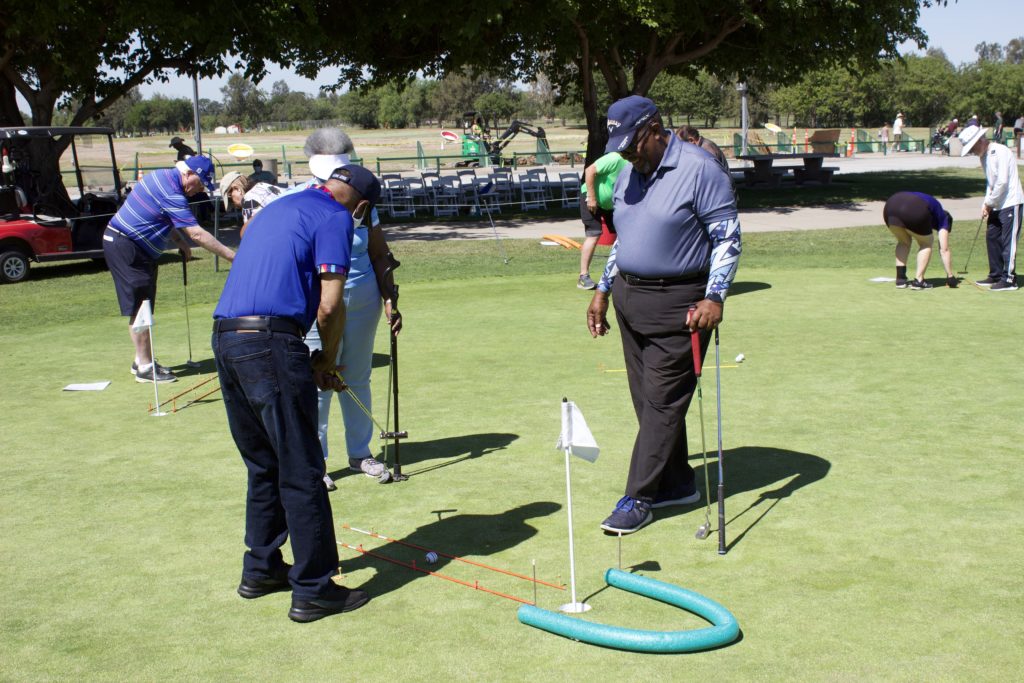
Hurdle began playing golf in 1975, as he was introduced to the game by his brother-in-law, Michael Servais. Hurdle was in the U.S. Army and was on leave at the time in Los Angeles.
“My brother-in-law had some clubs and took me out to the backyard. He taught me a couple things,” Hurdle said.
“I started playing golf after that. I was stationed in Arizona at the time. Our commanding officer was a golfer so I picked up some tips from him. When I went to Texas, our commanding officer was a golfer, plus a couple folks in my unit. We started playing golf; it was like $9 for 18 holes on base.”
Hurdle began playing golf more frequently after his father, Chester Hurdle, suffered a stroke about five years ago.
“It was a way for me to get out and do some things, and he wanted me to do things,” said Hurdle.
Hurdle got involved in “Saving Strokes,” a golf program founded by American Heart Association, Inc.
“Saving Strokes” began in 2001 in Sacramento with 26 participants, according to American Heart Association, Inc., at www.heart.org.
“The vision was to offer stroke survivors an opportunity to participate in golf for pleasure as well as for physical rehabilitation. Sixteen years later, this small program has grown to 25+ sites in Arizona, California, Hawaii, Idaho, Montana, Nevada, Oregon, Washington and Utah and serves over 1,500 participants annually,” American Heart Association, Inc., said on its website.
Hurdle told his dad that he was involved in “Saving Strokes,” going about helping people out in the game of golf who had suffered a stroke.
“He sat there for almost like 10 minutes, and I could just see his brain moving around. And he says, ‘OK, do that for me.’ He would ask me, ‘How are folks doing? Do they play as well as I do? When do I get a chance to get out there and try that? I’m ready to go out and try and play some golf.’ ”
It was at that point that Ken Hurdle made a commitment – to be dedicated to doing all he can to helping out people with disabilities learn about golf.
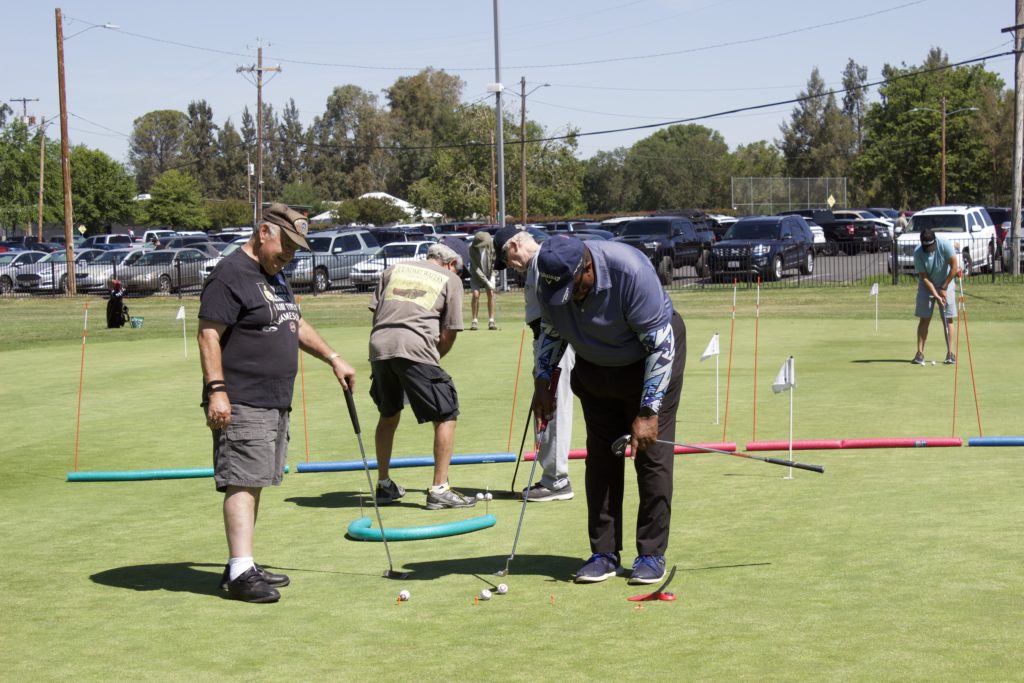
“My dad said he was proud of me for doing it for him,” Ken Hurdle said.
Chester Hurdle passed away in 2016.
Northern California Institute of Golf According to the Haggin Oaks website, www.hagginoaks.com, “The Northern California Institute of Golf provides an athlete-centered approach to improving a student’s game. Golf Coaches are trained to understand not only technical swing techniques but perhaps more importantly, the human skills of golf. We build long-lasting, trustworthy relationships while having the student understand the most important aspects of the game and practice habits for effective results.”
For more information
More information about “Golf Fore Health” can be obtained by calling the Northern California Institute of Golf concierge at the Haggin Oaks Golf Complex at (916) 808-2531, or by visiting the Haggin Oaks Golf Complex Super Shop, 3645 Fulton Ave., Sacramento.
* Marty James is a freelance writer who makes his home in Napa. He retired on June 4, 2019, after spending 40 years as a sports writer, sports editor and executive sports editor for the Napa Valley Register, a daily newspaper in Napa County. He is a 1979 graduate of Sacramento State and a member of the California Golf Writers & Broadcasters Association. He was inducted into the CIF Sac-Joaquin Section Hall of Fame in 2016.
